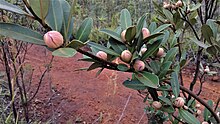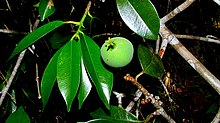| Clusiaceae Temporal range: Maastrichtian - recent PreꞒ Ꞓ O S D C P T J K Pg N Possible Turonian record | |
|---|---|

| |
| Clusia rosea | |
| Scientific classification | |
| Kingdom: | Plantae |
| Clade: | Tracheophytes |
| Clade: | Angiosperms |
| Clade: | Eudicots |
| Clade: | Rosids |
| Order: | Malpighiales |
| Family: | Clusiaceae Lindl. |
| Type genus | |
| Clusia | |
| Synonyms | |
|
Guttiferae | |
The Clusiaceae or Guttiferae Juss. (1789) (nom. alt. et cons. = alternative and valid name) are a family of plants including 13 genera and ca 750 species. Several former members of Clusiacae are now placed in Calophyllaceae and Hypericaceae. They are mostly trees and shrubs, with milky sap and fruits or capsules for seeds. The family is primarily tropical. More so than many plant families, it shows large variation in plant morphology (for example, three to 10, fused or unfused petals, and many other traits). According to the APG III, this family belongs to the order Malpighiales.
One feature which is sometimes found in this family, and rarely in others (e.g., Malpighiaceae), is providing pollinators with "pollination rewards" other than pollen or nectar; specifically, some species offer resin, which certain bees use in nest construction (each Clusiaceae species offers only one type of reward).
Taxonomic history
The family Clusiaceae was divided by Cronquist into two subfamilies: the Clusioideae (typical subfamily) and the Hypericoideae. The latter was often treated as a family—the Hypericaceae or St. John's wort family. Elements of the Hypericoideae are more common in northern temperate areas and those of the Clusioideae are centered in the tropics.
Later classifications, however, divide the family in a finer way. Molecular studies have shown that the family Podostemaceae—the riverweeds—as well as the Bonnetiaceae are nested in this group. Their inclusions make the Clusiaceae in a wide sense polyphyletic, and Stevens's subfamilies need to be recognised at family level: Clusioideae as Clusiaceae sensu stricto; Hypericoideae as Hypericaceae; and Kielmeyeroideae as Calophyllaceae.
Classification



Following Ruhfel et al. (2011)
- Tribe Clusieae
- Tribe Garcinieae
- Allanblackia
- Garcinia (including Rheedia) - saptree, mangosteen
- Tribe Symphonieae
- Tribe incertae sedis
See also

References
- "Malpighiales". www.mobot.org. Retrieved 2023-06-16.
- Angiosperm Phylogeny Group (2009). "An update of the Angiosperm Phylogeny Group classification for the orders and families of flowering plants: APG III". Botanical Journal of the Linnean Society. 161 (2): 105–121. doi:10.1111/j.1095-8339.2009.00996.x. hdl:10654/18083.
- Christenhusz, M. J. M. & Byng, J. W. (2016). "The number of known plants species in the world and its annual increase". Phytotaxa. 261 (3): 201–217. doi:10.11646/phytotaxa.261.3.1.
- ^ Gustafsson, Mats H. G. (2002), "Phylogeny of Clusiaceae Based on rbcL sequences", International Journal of Plant Sciences, 163 (6): 1045–1054, doi:10.1086/342521, JSTOR 3080291, S2CID 85307271
- Stevens, P. F. (1980). A revision of the Old World species of Calophyllum (Guttiferae). J. Arnold Arboretum 61:117–699.
- APG III (2009)
- Ruhfel, B. R., V. Bittrich, C. P. Bove, M. H. G. Gustafsson, C. T. Philbrick, R. Rutishauser, Z. Xi, and C. C. Davis. (2011) Phylogeny of the Clusioid Clade (Malpighiales): Evidence from the Plastid and Mitochondrial Genomes. American Journal of Botany 98: 306–25.
- Akkemik, Ü.; Güngör, Y.; Mantzouka, D.; Azaz, D. (2022). "Mammeoxylon beylikduezuense Akkemik, Güngör, D. Mantzouka & Azaz sp. nov.: The First Report of the Genus for the Oligo/Miocene of Eurasia". Forestist. doi:10.5152/forestist.2022.22024. S2CID 251152015.
Bibliography
- van Rijckevorsel, Paul (November 2002). "(1564) Proposal to Conserve the Name Platonia insignis against Moronobea esculenta (Guttiferae)". Taxon. 51 (4): 813–815. doi:10.2307/1555050. JSTOR 1555050.
External links
- See Guttiferae in L. Watson and M.J. Dallwitz (1992 onwards). The families of flowering plants: descriptions, illustrations, identification, information retrieval. https://web.archive.org/web/20070103200438/http://delta-intkey.com/
- Garcinia Rat Studies
- See Key to Clusiaceae (Guttiferae) genera from Brazil (in Portuguese)
| Taxon identifiers | |
|---|---|
| Clusiaceae |
|
| Guttiferae | |